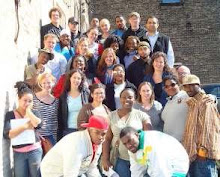
2/25/08
last friday, after the ally-led training on the history and current state of milwaukee public schools, ASSET met at the uwm continuing ed. building for yet another evaluation process known as gift seats.
during this process, everyone in a tsp group is able to give one-on-one feedback to fellow allies. this can be informative and helpful, or plain nasty. i assumed that it would be quite terrible, given the way i've been feeling about the group's response to my presence. that, and whenever we come to a milestone moment in the program, i am wont to think the worst (like mid-year, IDPs, and things like that.)
our gift seat session was actually rather tame, even encouraging. i decided to go first in order to get it over with, and to have a more fair ability to give feedback. i sat at the head of the table, bracing myself.
i imagined this moment to begin with the team tearing into me, offering only negative criticism and disdain, but james spared us by offering up a list of questions. we were allowed to ask each team member 1 question from the list. some of them were:
-what makes me a good public ally?
-what are my assets?
-what are some of the challenges of working with me?
i think the most interesting question was framed very well: would you help me with ____________. this question allowed for you to decide what you needed help with, and to specifically charge a team member to assist you and keep you accountable. more than any of the others, i think this question really opened us up to the reality of the team.
after we all got finished and had a turn at the head of the table, i felt lighter. it's possible that this simple (yet incredibly challenging) exercise allowed us to express ourselves honestly. i noticed that everyone gave feedback to the best of their ability, and did so in a positive manner. even some of the questions that were meant to expose problems were responded to in an encouraging way. this gives me hope for the tsp project.
we're at the halfway point in the program, and i find myself thinking about all the things we've done, some of the feelings i've had. i remember receiving a letter from one of last year's allies. s/he warned me that the process was not going to be easy, but it would be worth it, and it would probably change my life. i don't think i put too much stock into that at first. as this whole thing continues and i interact with more people on an individual level, i'm coming to see that couldn't be more true. laying my expectations aside, i am finding it easier to embrace what is actually happening. things are less negative for me; it's easier to deal with the bad things and easier to be grateful for the good ones. every person is an asset, every moment is a lesson.
just because the solutions of problems are not visible at any particular time does not mean that those problems will never be alleviated -- or confined to tolerable dimensions. history has a way of changing the very terms in which problems operate and of leaving them, in the end, unsolved, to be sure, yet strangely deflated of their original meaning and importance.
-m. i. abramowitz
last friday, after the ally-led training on the history and current state of milwaukee public schools, ASSET met at the uwm continuing ed. building for yet another evaluation process known as gift seats.
during this process, everyone in a tsp group is able to give one-on-one feedback to fellow allies. this can be informative and helpful, or plain nasty. i assumed that it would be quite terrible, given the way i've been feeling about the group's response to my presence. that, and whenever we come to a milestone moment in the program, i am wont to think the worst (like mid-year, IDPs, and things like that.)
our gift seat session was actually rather tame, even encouraging. i decided to go first in order to get it over with, and to have a more fair ability to give feedback. i sat at the head of the table, bracing myself.
i imagined this moment to begin with the team tearing into me, offering only negative criticism and disdain, but james spared us by offering up a list of questions. we were allowed to ask each team member 1 question from the list. some of them were:
-what makes me a good public ally?
-what are my assets?
-what are some of the challenges of working with me?
i think the most interesting question was framed very well: would you help me with ____________. this question allowed for you to decide what you needed help with, and to specifically charge a team member to assist you and keep you accountable. more than any of the others, i think this question really opened us up to the reality of the team.
after we all got finished and had a turn at the head of the table, i felt lighter. it's possible that this simple (yet incredibly challenging) exercise allowed us to express ourselves honestly. i noticed that everyone gave feedback to the best of their ability, and did so in a positive manner. even some of the questions that were meant to expose problems were responded to in an encouraging way. this gives me hope for the tsp project.
we're at the halfway point in the program, and i find myself thinking about all the things we've done, some of the feelings i've had. i remember receiving a letter from one of last year's allies. s/he warned me that the process was not going to be easy, but it would be worth it, and it would probably change my life. i don't think i put too much stock into that at first. as this whole thing continues and i interact with more people on an individual level, i'm coming to see that couldn't be more true. laying my expectations aside, i am finding it easier to embrace what is actually happening. things are less negative for me; it's easier to deal with the bad things and easier to be grateful for the good ones. every person is an asset, every moment is a lesson.
just because the solutions of problems are not visible at any particular time does not mean that those problems will never be alleviated -- or confined to tolerable dimensions. history has a way of changing the very terms in which problems operate and of leaving them, in the end, unsolved, to be sure, yet strangely deflated of their original meaning and importance.
-m. i. abramowitz


No comments:
Post a Comment